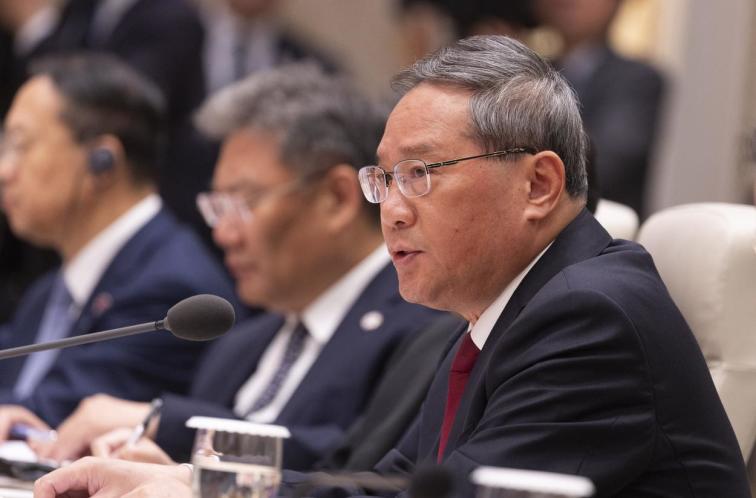File photo: On March 5, 2021, the day before the opening of China‘s National People‘s Congress (NPC), police patrol Tiananmen Square with dogs on a day of heavy air pollution in Beijing. (Photo by Kevin Frayer/Getty Images.)
[People News] On July 17, the Indian media outlet Global Governance News published an article by Poonam Sharma titled “China’s Plan to Backstab Russia Exposed by Diplomat Defector”, summarising the turmoil within the Chinese Communist Party (CCP) and Xi Jinping’s personal political gamble.
As the CCP’s annual Beidaihe meeting approaches, the situation behind Beijing’s closed doors is boiling over with unprecedented intensity. Rumors, defections, diplomatic blunders, and leaked strategic documents all point to fierce internal struggles within the regime. A major shift in foreign policy, especially toward Russia, appears imminent.
1. Rumours Abound: Smoke Behind the Curtain
Every year, various CCP factions use the Beidaihe meeting to apply pressure, leak information, and undermine rivals. This year’s media warfare is particularly dark:
Rumours are swirling about Xi Jinping’s deteriorating health—allegations include Parkinson’s disease, hypothyroidism, heart issues, kidney dysfunction, and even fatty liver or cirrhosis caused by alcohol.
Even more explosive are personal scandals: it’s said that Xi and his wife are estranged, and she may be involved in military power struggles, recently attempting to distance herself from his “dark history.”
Although unverified, the sheer scale and intensity of these rumours indicate that Xi—once seen as “untouchable,” is quickly losing authority.
2. Defection and Betrayal: Diplomat Escapes to Russia
One of the most shocking incidents is the defection of a Chinese diplomat to Russia. Reportedly, after a serious conflict with his superior, he fled to Russia with that superior’s wife, carrying a cache of highly sensitive documents.
These documents allegedly reveal Beijing’s secret “Plan B” in case of Russian defeat and the collapse of Putin’s regime, which includes two key strategies:
-
Backing a pro-CCP regime: Support Russia’s Communist Party and, in the power vacuum after Putin’s fall, reshape Russia into a European stronghold of communism.
-
Partitioning the Russian Far East: If the U.S. supports pro-Western forces in European Russia, the CCP would support factions east of the Urals to form a “Far Eastern Russian Federation,” enabling China to control Siberia’s resources and build a buffer zone against the West.
These plans reportedly detail troop deployments, energy control, and a full political reorientation of Russia—an outright backstab to Putin.
3. Putin’s Response: Nuclear Threats and Diplomatic Blackmail
The Russian Foreign Ministry did not take this lightly. By mid-June, the defector and the wife were reportedly returned secretly, along with a diplomatic note stating:
“Russia is powerful and invincible—and will always remain so.”
This is not just rhetoric—it’s a warning.
While Putin is said to be furious, he has not broken ties with Beijing but instead is using the incident as leverage to demand more from China.
4. Brussels Slip-Up: CCP’s “Neutrality” Mask Torn Off
On July 2, during diplomatic talks in Brussels, Chinese Foreign Minister Wang Yi made a shocking statement:
“Beijing cannot accept a Russian defeat in Ukraine, or else the U.S. will turn its focus to Beijing.” This admission completely tears away Beijing’s long-maintained mask of being a “neutral mediator.” Analysts believe this statement was made under Xi Jinping’s direct instructions.
5. Strategic Agreement: Will China and Russia Sign a “Quasi-Alliance” Pact?
To repair relations, China and Russia are reportedly preparing to sign a comprehensive strategic agreement on September 3, the anniversary of WWII’s end, during a military parade in Beijing. According to insiders, the agreement includes:
Beijing’s full support for Russia’s military actions in Ukraine and Europe. Strengthening military and intelligence cooperation. Possible deployment of nuclear submarines in the Arctic. Joint pressure on Japan to weaken its pro-Taiwan stance. Russian logistical and energy support if a war breaks out in the Taiwan Strait.
This pact edges very close to a Cold War-style military alliance.
6. Internal Chaos: Anti-Xi Factions on the Move
Reports suggest disarray within Xi Jinping’s inner circle. Senior military officials are being removed at a high rate. Party elders and influential backroom figures are questioning his diplomatic, economic, and political strategies. Top officials in the Public Security Ministry and the Ministry of State Security have been disappearing—evidence of loyalty fractures within the CCP.
These factions appear to be waiting for Xi to “crash” diplomatically, so they can strike from behind.
7. Strategic Grand Design: Return to Imperial Ambition
All signs point to a shift in China’s geopolitical strategy—from the low-key “hide and bide” approach to aggressive imperial expansion:
Aligning with authoritarian states to spread ideological influence
Using military and political pressure to reshape borders
Opening multiple fronts to distract the West—Ukraine, Taiwan, South China Sea
Weakening Russia to seize resources and territory, positioning China as a regional hegemon
8. Xi’s Gamble, the World’s Risk
Xi Jinping’s double gamble—on both seizing Russia’s Far East and forming an anti-Western alliance with Moscow—appears bold, but is in fact fraught with danger.
Despite their alliance façade, Beijing and Moscow are deeply distrustful of each other. Xi knows that if Putin restores relations with Trump, Russia could pivot back to the West. Western intelligence agencies are closely monitoring China’s activities in Russia, including efforts to recruit Russian officials and lay the groundwork for control of the Far East.
All of Xi’s moves—driven by survival instincts and power consolidation—are laying the groundwork for a future conflict: the military invasion of Taiwan.
The world is now facing a CCP that no longer hides its political ambitions, that breaks promises openly, and rules through conspiracy and deceit. The global order is being reshaped—not just in words, but through secret strategies now gradually being exposed.
(Original report from People News)











News magazine bootstrap themes!
I like this themes, fast loading and look profesional
Thank you Carlos!
You're welcome!
Please support me with give positive rating!
Yes Sure!